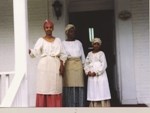
NPS Photo From the late 1600s to the early 1800s tobacco, wheat and other crops helped bring prosperity to the slaveholders that owned property that is now Oxon Cove Park. This prosperity came at huge price—bondage, hard labor, and broken families for the enslaved African Americans. No information about the lives of the enslaved people who lived on the Mount Welby plantation survives in their own words. Their voice is still unheard and their stories untold. The wills, letters, and records of the Debutts family tells part of the story, but only from the slaveholders’ point of view. African Americans named George, Edward, Hamilton, Minta, Patsy, and Matilda, among others, lived in bondage on the land. Most able-bodied bondspeople—men, women, and older children—worked in the fields. One or two probably worked as cooks or servants in the main house. Enslaved African Americans considered property by law, and were far the most valuable property after the land itself. A few enslaved people were freed by their owners, usually after years of forced service. Along with their labor, African Americans— free and enslaved—brought their language, skills, food, music, stories, and history to the property, Maryland and the nation. |
Last updated: April 10, 2015
